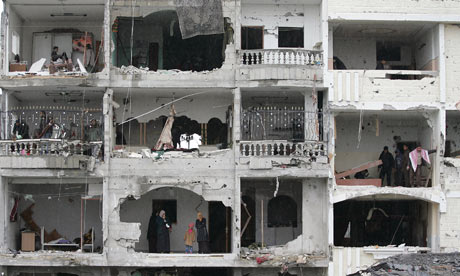
"I learnt all the words and broke them up
To make a single word: Homeland"
I Come From There by Mahmoud Darwish
Our newspapers and televisions are filled with two different versions of the same story; two conflicting narratives of the current conflict in Gaza. In the first days of the offensive, like many others, I spent the evenings switching between Al Jazeera's and CNN's coverage; between unrelenting war footage with threadbare analysis, to the American networks, with little footage and a permanent drone of commentary and theorising noise. Between the two, there seemed to be no way to get to the core of the reality, with Gaza so hermetically sealed that even its current tragedy loses some of its power in transmission, if only because it feels so locked, untouchable, even from less than 100 miles away here in Amman. It was with this sense of failure already established that I began re-reading Israeli and Palestinian novelists and poets, hoping these writers could begin to give voices to the current statistics, particularly since access to one side of the conflict has been almost completely cut off.
As with all writing on the topic, it's hard to know where to start. There are so many caveats to place at the beginning of any discussion of Palestinian literature that it can become another eternal preface that prevents us ever reaching the heart of the matter, the core of the writing. In the 1960s Ghassan Khalifani coined the term "resistance poetry" in reference to the work of Palestinian writers such as himself and Tawfiq Ziad , but it is a term that Palestinian writers have at times resisted, or at least sought to rewrite on their own terms. The Palestinian poet Mourid Barghouti also spoke eloquently of the pitfalls of being reduced to a totem of a lost people, and refused to sacrifice "aesthetics for your readership", pointing out "we're not one-theme poets. A moment of joy or misery is juxtaposed by its opposite."
There's the danger that the concept of "resistance poetry" becomes another way that Palestinian culture is colonised, in placing Palestinians again in terms of their relationship to Israel. Conversely, attempts to make a post-resistance literature seem to ignore the reality of the situation, as though there could be an "after-occupation" literature while the political occupation remained present. Another layer of loss is losing the ability or right to trace the subtle stylistic dialogues between Israeli and Palestinian writers – as long as noting the influence of Israeli poet Yehuda Amichai on Mahmoud Darwish's work runs the risk of seeming to place Palestinian culture as subordinate to Israeli culture, some critics prefer to leave the line undrawn.
But still, at the core of it, after all the caveats, there is the writing. Most striking is the breadth of Darwish's humanity, intellect and voice: even amid his frequent allegorical references to the lost Edens and biblical exiles, the poetry remains at the same time personal and exploratory. In poems like Psalm 9 and Homing Pigeons, he uses the language of the Song Of Songs without losing the specificity of the very real figures involved. Just as startling are the novels and short stories of Sahar Khalifeh with their sudden bursts of defiant humour and Nabokovian skill for drawing out characters within the space of a few sentences.
Emile Habibi, an Arab-Israeli writer who died in 1996 and was commemorated on Israeli postage stamps in 2003, also mixed humour with pathos and fantasy, as if the reality had to be approached from many angles at once. But his famous novel The Secret Life Of Saeed: The Pessoptimist is not fractured by his approach, so much as it broadens itself to let in many voices and experiences simultaneously: the pessimism and optimism that sit together in the title. Contemporary Jordanian-Palestinian writer Ibrahim Nasrallah writes a different kind of "comedy": his reworking of Balzac's Comedie Humaine into his Palestinian Comedy novels reflects how the varied experiences of occupation and exile in Jordan, Syria, Lebanon and the diaspora have made "Palestinian peoples, and not a single Palestinian people."
It goes without saying that Israel's premier contemporary writers such as David Grossman have also produced some of the greatest feats of sustaining the multiple narratives and voices of Israel and Palestine. As well as works such as Sleeping On A Wire, which focus on the Palestinian experience, Grossman's 1986 novel See Under: Love threads stories of both memory of the holocaust and 1950s Israel alongside the alienation that comes from a lack of memory, as one character dreams of finding an ever-elusive "White Room" in the Yad Vashem Holocaust Museum that would lead to an entrance into understanding.
But it is the late Israeli poet Yehuda Amichai who still seems most able to stretch enough to encompass the suffering on both sides. As much as they dreamed of peace, both Darwish and Amichai rejected the sterile language of the peace treaty, playing with the paper-white terms of conventions and constitutions, converting them into something touchable and everyday. In Wildpeace, Amichai's vision of peace is not the technical "peace of a cease-fire", but a living thing:
"Let it come
like wildflowers
suddenly, because the field
must have it: wildpeace."

